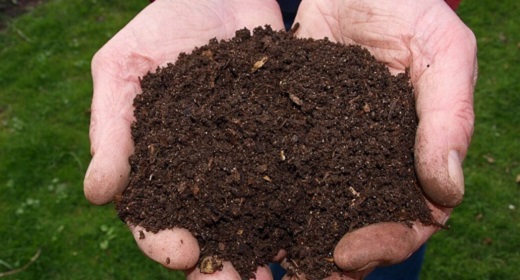by Chantal Pierrat: When people we love, our communities, and the entire world are at their most vulnerable, my first impulse is to jump to “fix-it” mode.
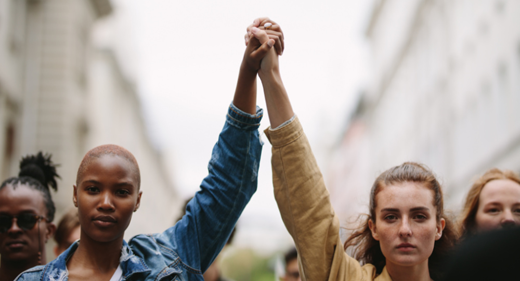
Yet recently I have realized that this can be a diversion, a way to avoid the real work of fixing — feeling.
With the world crying out for change, it’s a time to act, to lead with our voices, but it’s also a time to follow…and to feel.
‘Feeling it’ is a critical step in the process of healing trauma, grief, anxiety, negative thinking patterns, collective anger, and other painful experiences that seem to be on rotation these days.
When the COVID-19 crisis hit, I was too busy to pay attention to my feelings. Busy pivoting my business. Busy juggling fractions and grammar and homeschooling. Busy making sure my kids weren’t spending all day living in 50 different Minecraft realms.
And when I had a second to breathe, I was inhaling the scent of what was on everyone else’s limited menu of COVID feelings: fear, anxiety, grief.
Still, I soldiered on, stuffing those feelings aside. I needed to get through. We all did. There was too much to worry about to pay attention to everything.
Then, Ahmaud Arbery, Christian Cooper, George Floyd, Breonna Taylor, and Rayshard Brook, and so many others. And the 1,298 black U.S. citizens shot by the police in the past year — the ones whose deaths went unnoticed because body cams had been turned off and good samaritans weren’t nearby with their phones ready and waiting.
Not to mention the fact that people of color are dying of COVID at a rate of 3.57 times more than white people. According to the CDC:
“Non-Hispanic American Indian or Alaska Native persons have a rate approximately five times that of non-Hispanic white persons, non-Hispanic black persons have a rate approximately five times that of non-Hispanic white persons, Hispanic or Latino persons have a rate approximately four times that of non-Hispanic white persons.”
With all of this coming at me at once, I broke. I crossed a threshold. In my confusion and the chaos around me, with the graphic media in front of me and when I could not look away, I fell apart. All of a sudden, I couldn’t think straight for the rage in my heart. I felt like I was going to be sick and that feeling of nausea is still with me.
Author Glennon Doyle said at an Emerging Women Live event:
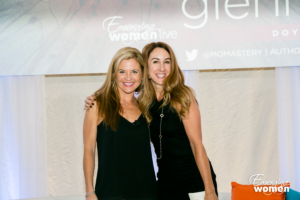
“Show me what breaks your heart and I will tell you your purpose.” (Do you not freaking love this?)
What I realized is that what breaks my heart is abuse of power and the suppression of personal freedom. What breaks my heart is when people are subjugated, unable to speak freely, and prevented from fully actualizing the truth of who they are.
Think of all the unexpressed potential that gets buried with these restricted souls!
This breaks my heart, and this is why I have dedicated my life to increasing women’s leadership, helping women be seen and heard, and creating a new paradigm for power that is sourced from our shared humanity.
When the Black Lives Matter movement was gaining momentum, we hosted co-founder Alicia Garza as a speaker at our national conference Emerging Women Live in 2017.
I remember digging into my own privilege and biases at that time, feeling overwhelmed by the issue and desperate to train myself ‘out of my white eyes’ — desperate to fix myself and find solutions to the racial tensions I was feeling in the women’s movement.
Then one of our African-American speakers, Promise Phelon, said to me, “Things will change when white people get as angry as black people are.”
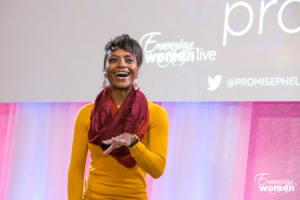
I did not understand this at the time. I thought, but I don’t feel angry.
As a Women’s Studies major, I consciously decided that I was not going to be an ‘angry’ feminist. Those women were too much, too confronting, they made me feel… uncomfortable.
Yes, I wanted change, but only acceptable change, change that was approved by those in power. I chose to fight for change while playing by the rules.
But being able to choose when to “fit in” and when to go against the grain is in itself a privilege. One that is not afforded to black women of color.
In our patriarchal system, we can see white privilege showing up in so many places, and we also see the privilege of the masculine. In our dominant culture, we over-privilege the mind, the rational, the measurable, the controllable, and we demonize the unknown, the mysterious. Anything that falls under the category of unpredictable or anecdotal, such as the more nuanced world of the emotions, the heart.
We demonize emotions, especially the messy ones. We reward actions, especially ones that can be categorized under ‘advance and conquer’. We climb upward and onward without knowing why we want the promotion or what we would even buy with a six-figure salary. And the real rewards — emotional intelligence and personal development — become consolation prizes.
As a white woman I learned early on that emotions were dangerous, something to hide, something to apologize for, and to keep tidy. And as a spiritual devotee, I learned to detach from my emotions, to distrust them, to rise above them as the truly enlightened did, not muck around in such gross and relative states of consciousness.
But again, I was always afforded the choice to control my emotional footprint as a white woman.
Conversely, the angry black woman stereotype haunts black women of color every day, regardless of their level of expression. Just ask Michelle Obama, Serena Williams, and Shonda Rhimes.
Enter: fix-it mode. My sleeves rolled up, I told myself: I am doing something. Isn’t that more important than getting angry?
For six years, I was dedicated to using the Emerging Women Live platform to amplify this conversation, to filling our presenters’ list with diverse speakers, to making certain that I did not accidentally misstep as I hosted the stage for 550 women navigating this complex issue of race and what it means to be inclusive — me, a white woman with untrained privileged eyes and a whole lot more questions than answers.
Looking back I see my efforts as the white savior mode at its best. If we fix the pain we caused, the pain we’ve profited off and ignored for centuries, we don’t need to sit with the uncomfortable-ness of our own negligence, indifference, and white guilt.
The truth is, I have been living from the neck up, so focused on solving problems that I missed the opportunity to try to understand the pain of my black brothers and sisters. More to the point, I chose not to feel.
Daniel Goldman, the emotional intelligence pioneer, has said, “In a very real sense we have two minds, one that thinks and one that feels. These two fundamentally different ways of knowing interact to construct our mental life.”
So now I am in the messiness of my feeling mind. The pain is real but I also feel a strong love from seeing and connecting with so many people — people like you — who are also FEELING IT. I don’t want to rush out of this.
It’s our feelings — our heartbreak, our anger, our desires, our shared hope — that will catalyze our mind to create the solutions we need. Our swollen heads and egos have held the reigns of power for far too long; it’s our hearts that will drive us to a better world.
In her iconic civil rights song, I Wish I Knew How it Would Feel to Be Free, Nina Simone sings:
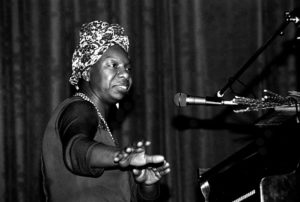
I wish you could know what it means to be me
Then you’d see and agree that every man should be free
I wish I could give like I’m longing to give
I wish I could live like I’m longing to live
I wish I could do all the things I can do
If we skip this feeling stage, both the recognition and the expression of our own feelings — as well as being curious about our fellow human beings — we might as well put lipstick on a pig.
Actions without true, authentic empathy behind them will not eradicate the long-ingrained, systemic abuse of power built on the back of out-of-balance masculine energy and white privilege. So keep the connection, lean into the heartbreak, and find your purpose in this conversation. It’s not going away anytime soon. And we have mountains to move.
PS: If you are a woman of color and have something relevant to share with our Emerging Women audience, I invite you to reach out to us so we can get you scheduled for a spot on our platform. We could share the mic — or just give you the damn mic. Use us…please.
PSS: If you are a woman of color coach with corporate or executive experience, and you are looking for more work, please reach out so we can interview you for a Power Circle facilitator role in our ongoing corporate women’s leadership programs.









